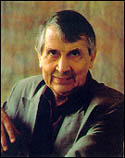By Vaughn Ormseth
March 12, 1999
|
|
RealAudio 3.0 28.8 |
For the last week, the Twin Cities has enjoyed a rare musical opportunity: to
hear a full range of the work of one of the world's leading composers, with the
artist himself in the audience. Einojuhani Rautavaara
is one of Finland's best-loved composers, and he has come to
Minnesota with a new work, which premieres this weekend. "Finland's Spirit:
Rautavaara" is sponsored by the Plymouth Music series, in collaboration with the
University of Minnesota and St. Olaf College.
FINLAND, THE REMOTE FORESTED COUNTRY novelist John Updike once dubbed "the
Minnesota of Europe" is a musical powerhouse. Though home to just 5 million
people, it produces an increasing number of the world's composers,
conductors, singers, and other musical artists. The composer, Einojuhani
Rautavaara, is a giant among them. The festival, being held this week in his honor,
draws from the full range of his output including an opera, Vespers, a symphonic-tone poem, chamber music, and several choral works.
![]()

Einojuhani Rautavaara
Rautavaara: I'm very happy that my music is played here and sung here and performed; even the opera. I feel sort of at home here, being here again in a place that seems to be very receptive to music.Since Rautavaara is best-known for his instrumental compositions, Plymouth Music Series Director Phillip Brunelle designed the festival to include a sampling of those works, but with an strong accent on vocal music.
Brunelle: I think audiences respond to Rautavaara's music because of his great love for text. He has this incredible way of getting inside a text, of setting a text, of giving it a real personal stamp. You really feel with Rautavaara that particular verses have a wonderful affect. And you sense that each piece that he has composed for chorus, and also his works for orchestra that each of them has a real special moment. And I think that's what draws audiences to the kind of wonder and joy they find in his music.A number of poets - Shakespeare, Garcia Lorca, and R.D. Laing among them - are represented this week, though one writer in particular animates the festival: the Finnish poet-hero Aleksis Kivi, whom Finns credit for saving their language and, by extension, much of the country's renowned cultural life. The festival opened with the English premiere of Rautavaara's most recent opera titled "Aleksis Kivi, " and concludes this weekend with the world premiere of three Kivi settings commissioned by the Plymouth Music Series.
Rautavaara: I think every Finn knows Kivi. He's a national writer and he was active in the middle of the last century when the Finnish language was fighting for its existence. And there was in fact no Finnish literature before him, very few things written, but nothing remarkable at all. And then suddenly, he's like an exotic flower coming up from nowhere, and is great. I think he still is the greatest Finnish writer and poet ever.But having a great poem to work with does not necessarily make the composers work easy. The last aria in Aleksis Kivi is a direct setting of one of the poets best known works "Song of My Heart. " Setting the poem to music was a daunting prospect for Rautavaara. The great Finnish composer, Jean Sibelius, had already set the poem in an arrangement for men's chorus that is by now part of the Finnish national consciousness.
Rautavaara: I was afraid of taking something so sacred for every Finn as this in the Sibelius setting is. But I'm very happy that I did. And now when I worked on it to be performed here, I made many changes, and its a different thing again.Plymouth's Brunelle says that as his singers rehearsed the three pieces in the newly commissioned "In the Shade of the Willow, " which includes a setting of "Song of My Heart, " the work took on a special life of its own.
Brunelle: The outpourings of his language are very personal. They're very deep. When we finished the first read-through, the Ensemble Singers as we finished the last note, there was a pause, and then in their own various ways they said to me, It is an honor to be able to sing this music.This ability to connect with audiences accounts in part for Rautavaaras growing fame in the United States. His Symphony No. 7, called "Angel of Light, " earned a Grammy nomination in 1997. Anneli Halonen, cultural counselor from the U.S. Embassy of Finland, says the Rautavara phenomenon here has been a pleasant surprise.
Halonen: Rautavaara is very much loved in the United States, and I'm quite astonished because its a boom. I like these kind of invasions when it comes via music because music unites people and peoples hearts really, elevates their hearts around the world. So its the best way of bringing our people together."Though Rautavaara's work steers clear of trends, it has satisfied audiences increasing desire for more atmosphere and introspection in music. He says his work is devoted to those realities that music alone can express.
Rautavaara: There is a message in a good music work always yet you cannot express in words and concepts what that message is. It can be very, very distinct, very clear, almost like information to you. A scientist wrote once that "the existence of music is a continuous intellectual scandal. " With that he meant that he understands that there is a message in music, and there are no words for that message. Its from another world. For a scientist that is a scandal, of course. For me, its a wonderful thing.The Rautavaara Festival "Finland's Spirit" continues through this weekend.
